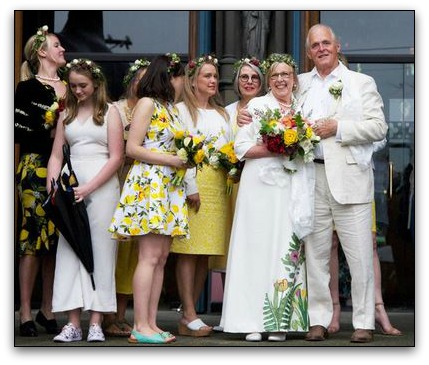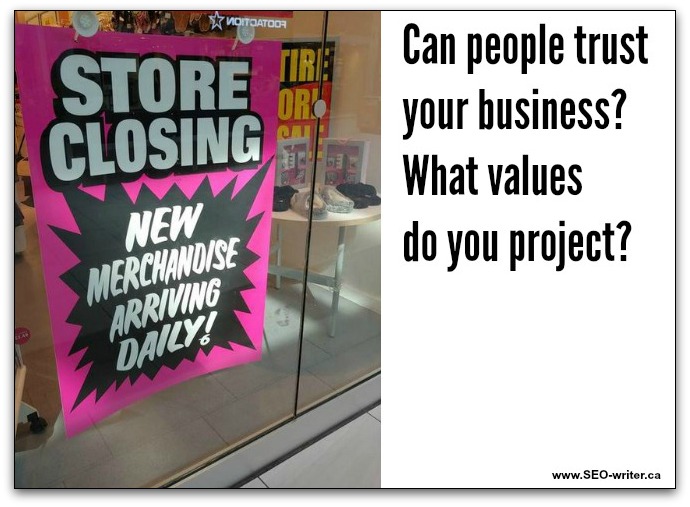Every business and every brand has values. The questions are whether you know what yours are and whether you are communicating them to your customers.
Have you ever thought about your brand values? What values do you project?
Although it might not seem obvious, people will decide where to shop based on the values a company projects. As a general rule, people buy from companies that appear:
- reliable
- trustworthy
- community-minded
- caring about their customers
Define your values
Depending on your product and your target market, there might be more specific values that would be important to project. For instance, if you are targeting a younger market these days, you had better show that you are green, because today’s youth cares about our planet.
Value-driven business is not new. People have always preferred to do business with someone they trust, with someone whose values align with their own.
There are two ways to define your brand values, and you should use both ways.
The first is based on who you are. What do you believe in? What is important to you? It might be the environment. It might be poverty. It might be freedom. It might be religion. It might be attention to detail.
Whatever is important to you, you should embrace. However, some values align more with your business activities than others. You don’t have to put all your values into your marketing.
Your values could be who you are, or they could be who you aspire to be. Both can be part of how you you define your brand values.
The second is based on your customers. What do they believe in? What is important to them? Even if something is not all that important to you, it is totally legitimate for your business to adopt a value that is important to your customers.
We believe in happiness, which is why we are called The Happy Guy Marketing. We also believe in trustworthiness and service – we want people to feel happy and satisfied. And we want to know that we served them well, even if sometimes that means sending them away.
Communicate your values
Choosing which values to adopt is one thing. But telling your story is another.
As I said earlier, you don’t have to communicate all your values as part of your marketing. For instance, you might hold certain religious values and you might live by them and run your business by them. But you might not feel that your business is the right venue for preaching.
The values you market should be aligned more with what is important to your customers. Isn’t that what all marketing is about? Some companies are very blatant about this, touting their efforts to be greener or the work they do in the community. Others are more subtle, weaving values into their regular product advertising.
Live your values
While it certainly helps to display your values to your customers, it’s even more important to live them. If you claim to be a friend of the environment, but people see you polluting, what does that tell them?
First, it tells them that you are not a friend of the environment.
Second, it tells them that you are a big fat liar, and they can’t trust you.
How many companies have you seen make that mistake on issues like the environment, on how they treat their workers, and how they treat women or ethnic minorities or on a range of other issues.

Say one thing. Do another. Nobody will trust you.
Nobody does a better job at showing themselves to be big fat liars than politicians. Yet nobody needs strong personal branding more.
It was refreshing last year to see Green Party leader Elizabeth May 100% on-brand at her wedding. She carries the environmental torch in Canadian politics. And she made her wedding an environmental showcase.
Substantively, it included:
- re-used flowers
- a potluck reception
- a motorcade of electric vehicles
- a cross-Canada train trip as the honeymoon
- 100 per cent post-consumer recycled paper programs
Symbolically, it was held on Earth Day and featured a wedding dress with greenery on it. As designer Sue Earle explained, it “…looked like she just walked through a garden.”
We extend this same approach to live by our values. We focus on customer happiness. We want to serve the best interests of our customers, even if it means sometimes telling them that they would be better off not paying us to do something that won’t bring them value. For example:
Hi Frank.
I spoke with our top fantasy writer. She is interested and is a fan of this trope, so that’s the good news. However, she does not feel we could be useful to you with just this information, and I agree. To go through 160,000 words, we would have to charge $1,500 for a high-level review, but without a story arc and plot, there is a good chance that only some of it would be useful.
I recommend you go ahead and draft the manuscript. Even if it’s an incredibly rough draft, we can work with that to give you useful advice.
I’m sorry to bring you what is probably disappointing news, but it is the best advice we can give (and it’s free!). If you come back to us with a draft, we will be happy to help.
Your brand values count
Whether they know it or not, people will choose to do business with you based on your brand values. They will decide if they can trust you. They will decide if your values align with theirs. It’s not all about money and it’s not all about quality. Those are two important values when making a purchase, but there are so many others.
Make sure to communicate your values through both your words and your deeds.









